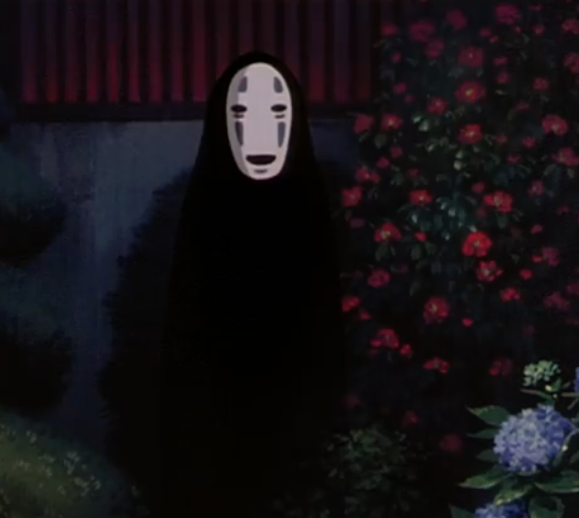Thoughts on No-face
Dec. 22nd, 2017 02:17 pm... Normally I'd be at the jail now, but I cancelled because I was nervous about driving in the snow... and so instead I'm sharing thoughts on No-face, from Spirited Away.
In the film, Chiriru lets No-face into the bathhouse, thinking it's one of the gods who've come to relax there, when really it's literally a nameless no-face.

No-face is apart from everyone, but wants to be included. Its early attempts at friendship are transactional--it gives Chihiru a precious bath token she needs to clean a filthy tub, and later it entices others by offering them gold nuggets.

But this is not friendship. People are dancing attendance because they're being paid, and that kind of attention ultimately isn't satisfying. No-face's hunger for friendship becomes acute, and it ends up devouring people.

Fortunately, Chihiru gives it an emetic, and it vomits out all the would-be friends it consumed. From then on, no longer threatening, it accompanies Chihiru. Although the film is focused on Chihiru's story, in the corners, you can observe No-face learning how to be companionable--for instance, by sharing work (here, spinning for Zenibaba).

In the end, I feel like it achieves a kind of silent intimacy that's fulfilling.
(Forgive the blurry screen shot; I wanted to use it instead of the more commonly seen frontal version because from this angle you can see in the curve of their shoulders a kind of closeness, more so than you can see from the front.)

It doesn't have to change its nature, but it does have to learn a means of interacting that's acceptable to others (and rewarding to itself)--this thought brought to you courtesy of![[personal profile]](https://www.dreamwidth.org/img/silk/identity/user.png) osprey_archer's recent entry in which she talks about a kind of unthinking "be yourself"-ism that's not very helpful when what you want to learn is how to be with others.
osprey_archer's recent entry in which she talks about a kind of unthinking "be yourself"-ism that's not very helpful when what you want to learn is how to be with others.
What I like about No-face's journey is that the journey is long, No-face has significant missteps early on, nevertheless gets to keep trying, and eventually reaches a better situation--without changing into something completely different.
In the film, Chiriru lets No-face into the bathhouse, thinking it's one of the gods who've come to relax there, when really it's literally a nameless no-face.

No-face is apart from everyone, but wants to be included. Its early attempts at friendship are transactional--it gives Chihiru a precious bath token she needs to clean a filthy tub, and later it entices others by offering them gold nuggets.

But this is not friendship. People are dancing attendance because they're being paid, and that kind of attention ultimately isn't satisfying. No-face's hunger for friendship becomes acute, and it ends up devouring people.

Fortunately, Chihiru gives it an emetic, and it vomits out all the would-be friends it consumed. From then on, no longer threatening, it accompanies Chihiru. Although the film is focused on Chihiru's story, in the corners, you can observe No-face learning how to be companionable--for instance, by sharing work (here, spinning for Zenibaba).

In the end, I feel like it achieves a kind of silent intimacy that's fulfilling.
(Forgive the blurry screen shot; I wanted to use it instead of the more commonly seen frontal version because from this angle you can see in the curve of their shoulders a kind of closeness, more so than you can see from the front.)

It doesn't have to change its nature, but it does have to learn a means of interacting that's acceptable to others (and rewarding to itself)--this thought brought to you courtesy of
What I like about No-face's journey is that the journey is long, No-face has significant missteps early on, nevertheless gets to keep trying, and eventually reaches a better situation--without changing into something completely different.



